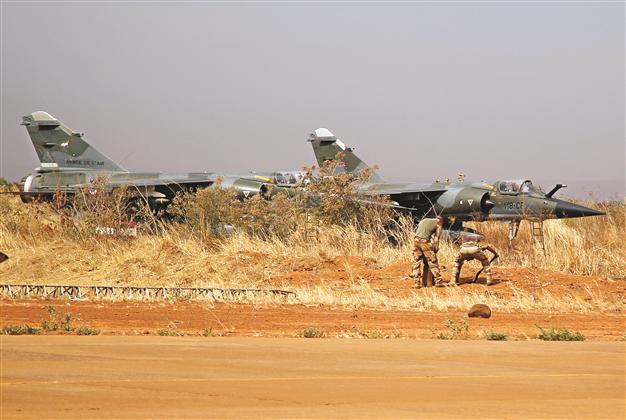Islamic group calls for Mali truce amid fighting
JEDDAH / BAMAKO

Two French fighter jets are seen at Bamako’s airport Tuesday Jan. 15,2013.AP Photo
The Organization of Islamic Cooperation, of which Mali is a member, called yesterday for a cease-fire in the West African country where France hit Islamist rebels with fresh air strikes and deployed armored cars yesterday.The military offensive is “premature,” OIC chief Ekmeleddin İhsanoğlu said in a statement, calling instead for “an immediate cease-fire in Mali and for all parties to go back to the negotiations which were led by Burkina Faso” in December.
İhsanoğlu, who “expressed his deep concern over the military escalation,” also called for “maximum self-restraint from all parties at this critical time in order to reach a peaceful solution to this conflict,” the statement said. France launched air strikes on Jan. 11 to back the Malian army in an operation against Islamist rebels and has sent troops to the country. A meeting of the 15-nation U.N. Security Council expressed unanimous “understanding and support” for the military intervention, France’s U.N. ambassador, Gerard Araud, told reporters late Jan. 14.
Armed with the U.N.’s backing, Paris is planning to triple the size of its force in Mali to a total of 2,500 troops, defense sources said yesterday.
“There will be a gradual build-up to a figure of 2,500,” a source close to Defense Minister Jean-Yves Le Drian said in a revelation that points to French forces playing a far bigger – and inevitably far longer – role in the campaign against Islamist groups in northern Mali than previously indicated. President François Hollande said earlier yesterday that there were currently 750 French soldiers in the former colony. The United States, France’s close ally, has ruled out putting any American troops on the ground in Mali.
U.S. Defense Secretary Leon Panetta has called the military operation important, although “there is no consideration of putting any American boots on the ground at this time.” He said that although al-Qaeda in the Islamic Maghreb (AQIM) and other affiliate groups in Mali may not pose an immediate threat to the United States, “ultimately that remains their objective.”
Since Jan. 11, the Islamists have fled three key towns under their control: Timbuktu, where residents have suffered some of worst abuses of the past 10 months, as well as Gao, also in the north, and Douentza in Mali’s center.
Though driven from their strongholds by French Rafale fighter jets, the Islamists struck back Jan. 14 in the government-held south, capturing Diabaly, around 400 kilometers northeast of the capital Bamako.
French planes hit Diabaly overnight, and at least five Islamists were killed and many injured, according to a security source. Hollande said the night’s strikes had “achieved their goal.”
West African army chiefs were meeting in Bamako late yesterday to plan the deployment of a U.N.-mandated, 3,300-strong intervention force in Mali. Nigeria, which will lead the force, plans to have 600 troops on the ground in Mali “before next week,” President Goodluck Jonathan said. Benin, Ghana, Niger, Senegal, Burkina Faso and Togo have also pledged troops.
U.N. refugee agency spokesman Adrian Edwards said yesterday that 1,230 refugees from Mali had arrived in Niger, Burkina Faso and Mauritania during the past week as a result of the clashes between the Malian army and Islamist groups.
Compiled from AFP, AP and Reuters stories by the Daily News staff.
















